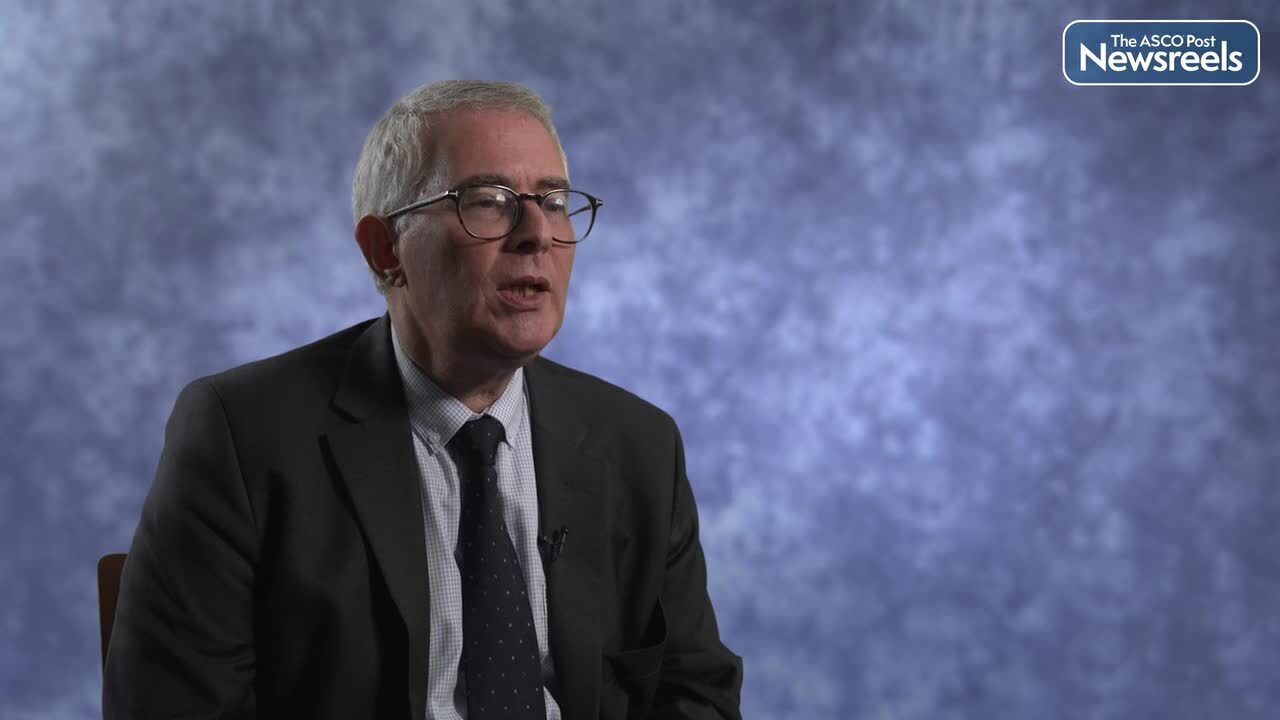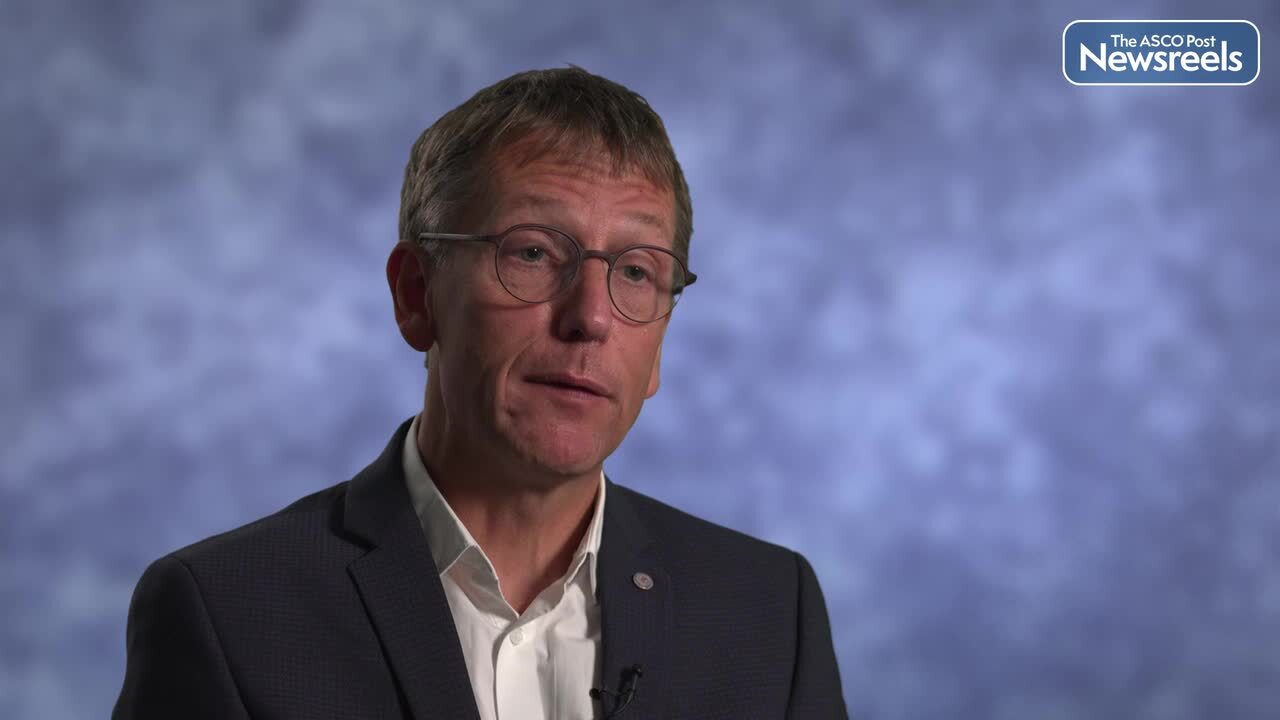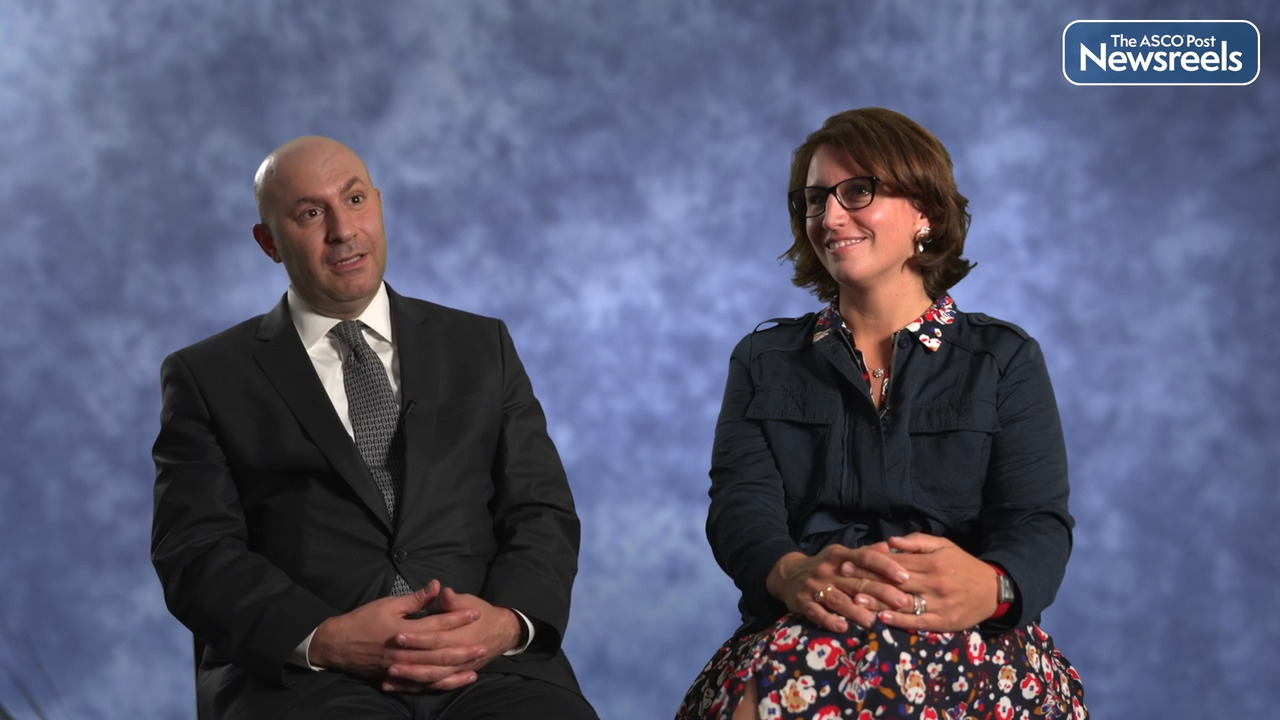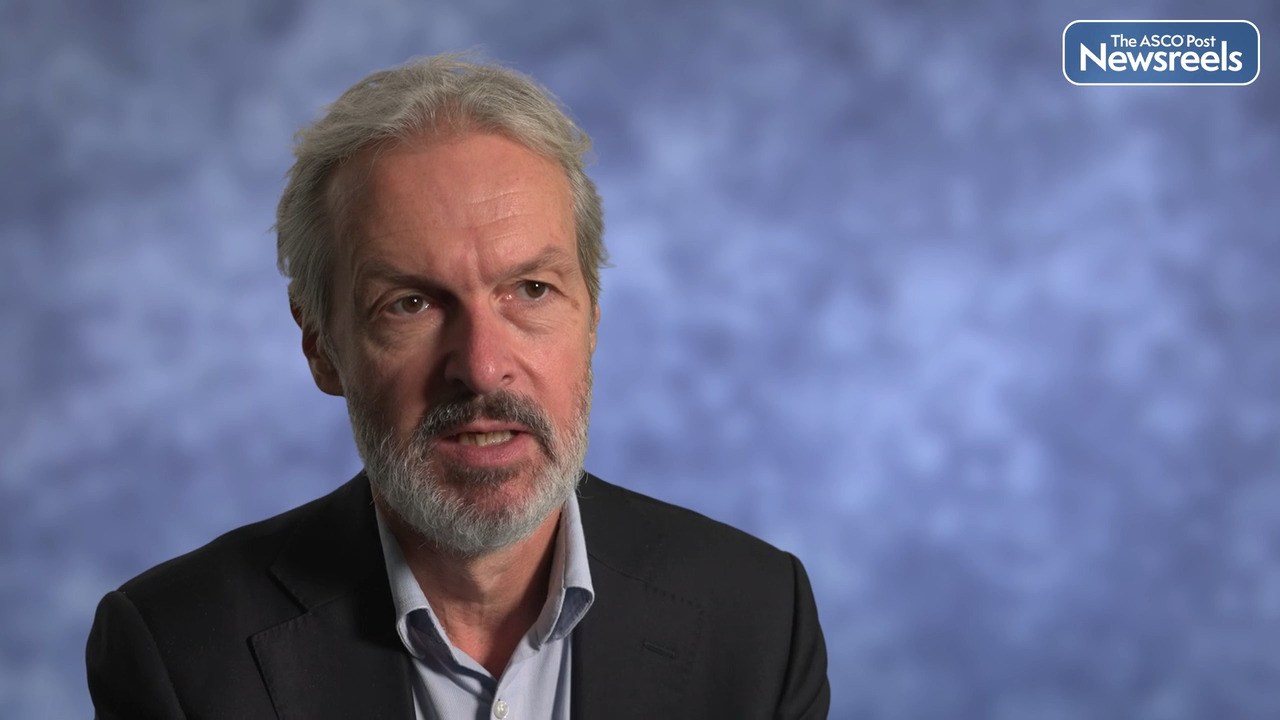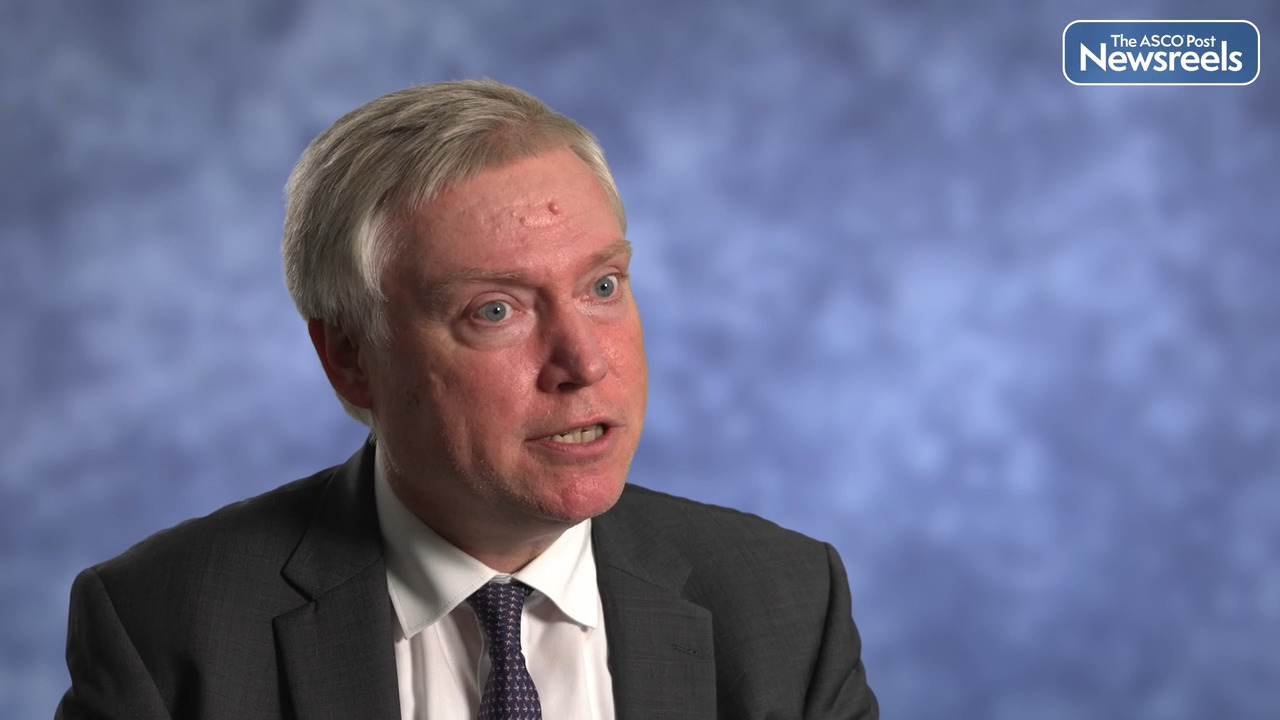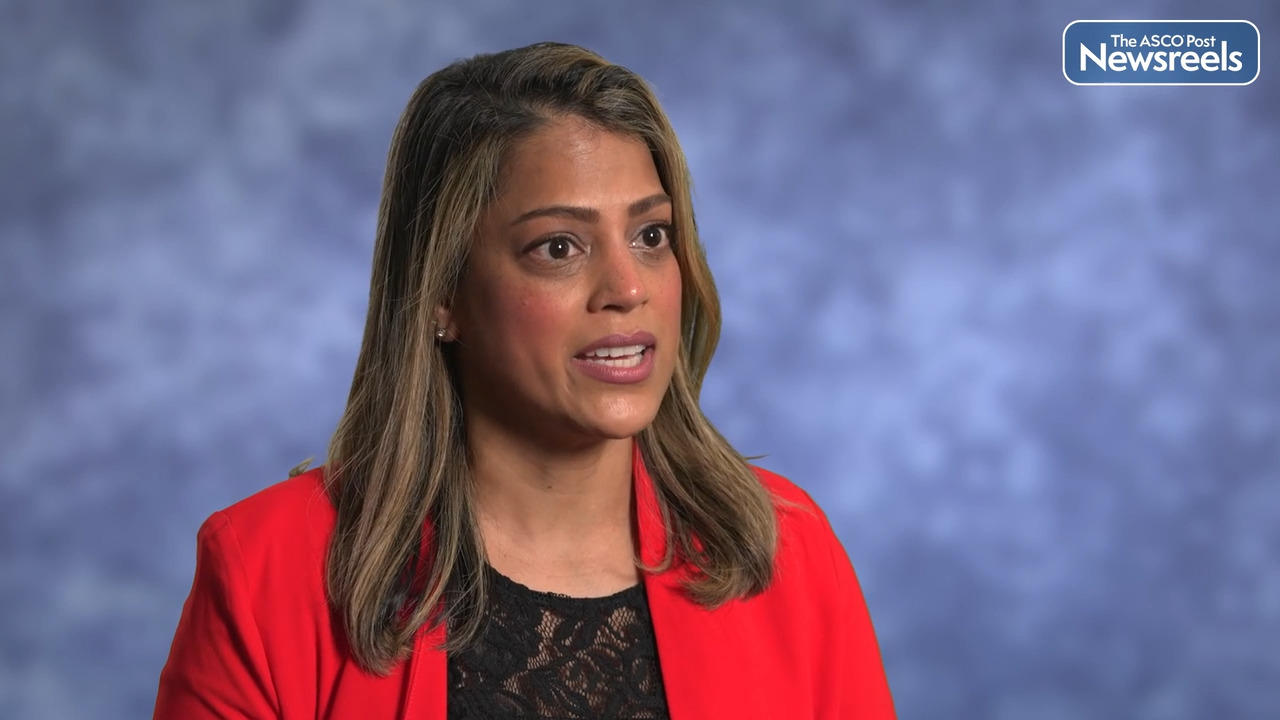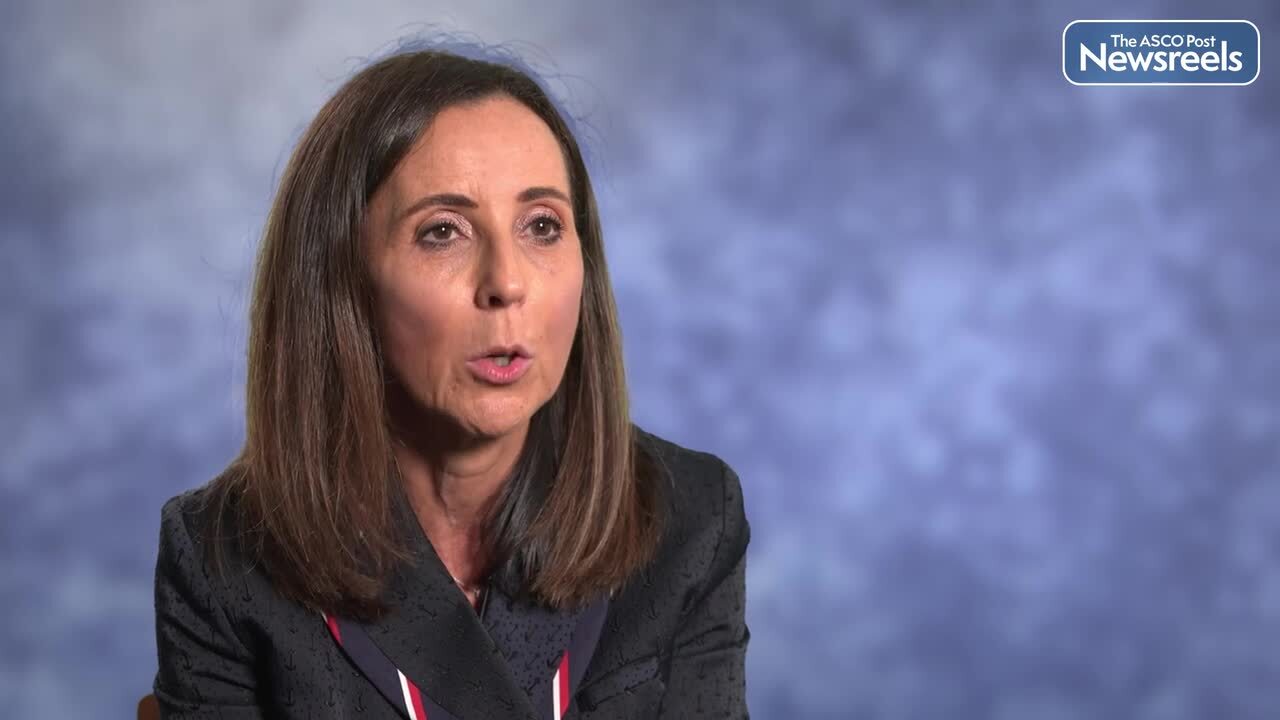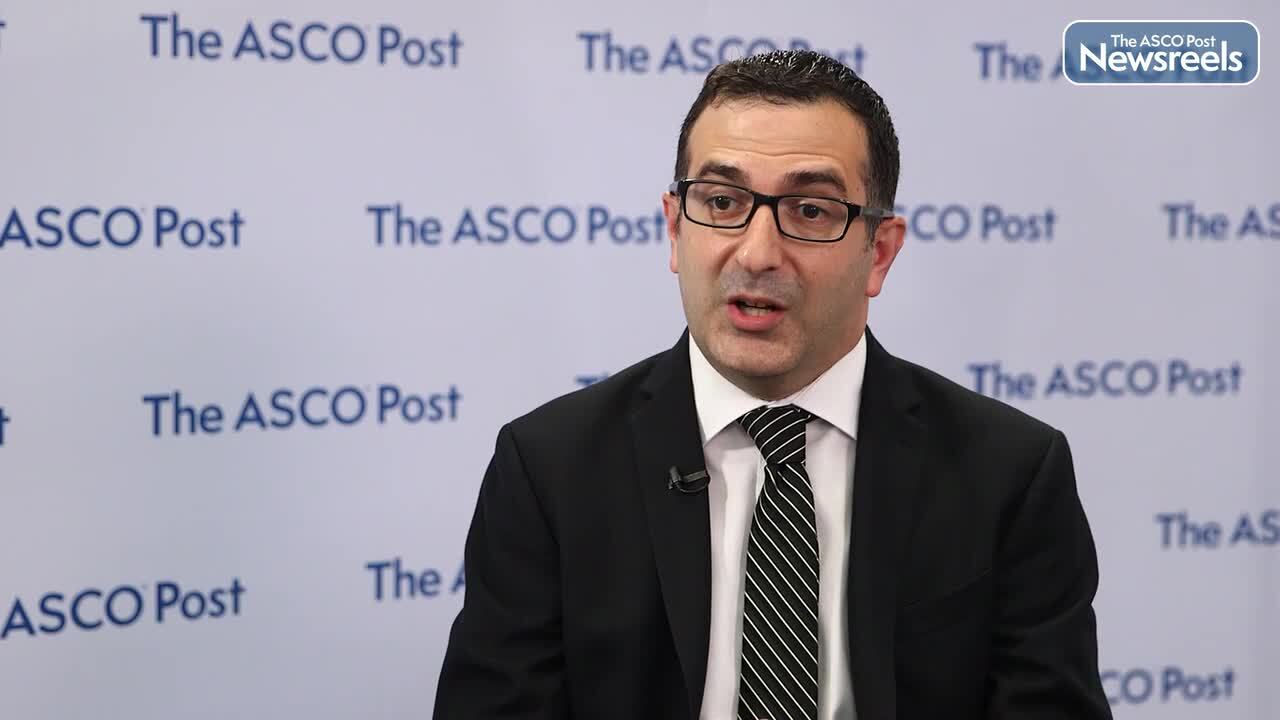Association of Neurofilament Light Chain Levels With ICANS Risk After CAR T-Cell Therapy
In a retrospective study reported in JAMA Oncology, Butt et al found significantly higher pretreatment neurofilament light chain levels in patients who did vs did not develop immune effector cell–associated neurotoxicity syndrome (ICANS) after CD19 chimeric antigen receptor (CAR) T-cell therapy....
Gérard Zalcman, MD, PhD, on Non–Small Cell Lung Cancer: Phase III Trial Findings on Nivolumab and Ipilimumab
Gérard Zalcman, MD, PhD, of France’s Bichat-Claude Bernard Hospital, Assistance Publique–Hôpitaux de Paris, discusses phase III results from the IFCT-1701 trial, which explored the questions of whether to administer nivolumab plus ipilimumab for 6 months or whether to prolong the treatment in patients with advanced non–small cell lung cancer (Abstract 972O).
Jean-Pascal Machiels, MD, PhD, on Head and Neck Cancer: Recent Data on Pembrolizumab and Chemoradiation Therapy
Jean-Pascal Machiels, MD, PhD, of Belgium’s Cliniques universitaires Saint-Luc (UCLouvain), discusses the primary results of the phase III KEYNOTE-412 study of pembrolizumab plus chemoradiation therapy (CRT) vs placebo plus CRT for patients with locally advanced head and neck squamous cell carcinoma (Abstract LBA5).
Adjuvant Atezolizumab Does Not Improve Disease-Free Survival in Patients With Renal Cell Carcinoma
Adjuvant therapy with the anti–PD-L1 therapy atezolizumab failed to improve disease-free survival compared to placebo in patients with renal cell carcinoma (RCC) at high risk of recurrence after resection, according to results of the phase III IMmotion010 trial presented by Axel Bex, MD, PhD, at...
Dual Checkpoint Inhibitor Blockade as First-Line or Salvage Therapy for Patients With Advanced Merkel Cell Carcinoma
Merkel cell carcinoma has a high rate of metastasis and poor patient outcomes. The current standard of care for patients with recurrent, unresectable, or metastatic disease is immune checkpoint inhibitor monotherapy targeting PD-1 and PD-L1, but only about half of patients respond to this therapy....
Early Research Identifies Effective Combination Immunotherapy for Subgroup of Patients With Metastatic Colorectal Cancer
A physician-scientist at City of Hope has identified a novel combination immunotherapy regimen—a triplet therapy consisting of regorafenib, ipilimumab, and nivolumab—that demonstrated significant response in patients with chemotherapy-resistant, microsatellite-stable metastatic colorectal cancer....
Toni K. Choueiri, MD, and Laurence Albiges, MD, PhD, on RCC: Recent Phase III Data on Cabozantinib, Nivolumab, and Ipilimumab From the COSMIC-313 Trial
Toni K. Choueiri, MD, of the Dana-Farber Cancer Institute, and Laurence Albiges, MD, PhD, of France’s Gustave Roussy Cancer Centre, discuss phase III findings showing that cabozantinib in combination with nivolumab and ipilimumab reduced the risk of disease progression or death compared with the combination of nivolumab plus ipilimumab in patients with previously untreated advanced renal cell carcinoma of IMDC (the International Metastatic RCC Database Consortium) intermediate or poor risk. However, the combination of cabozantinib, nivolumab, and ipilimumab vs nivolumab plus ipilimumab did not demonstrate an overall survival benefit to patients (Abstract LBA8).
Axel Bex, MD, PhD, on Renal Cell Carcinoma: Phase III Results With Atezolizumab as Adjuvant Therapy
Axel Bex, MD, PhD, of the Netherlands Cancer Institute, discusses phase III findings from the IMmotion010 study, which evaluated the efficacy and safety of atezolizumab vs placebo in patients with renal cell cancer who are at high risk of disease recurrence following nephrectomy (Abstract LBA66).
Martin Reck, MD, PhD, on NSCLC: New Findings on Cemiplimab, Nivolumab, and Ipilimumab
Martin Reck, MD, PhD, of Germany’s Lung Clinic Grosshansdorf, details two trials that included patients with advanced non–small cell lung cancer: 3-year survival outcomes in the EMPOWER-Lung 1 study of continued cemiplimab-rwlc beyond disease progression with the addition of chemotherapy, and phase III results from the IFCT-1701 trial of nivolumab plus ipilimumab 6-month treatment vs treatment continuation (LBA54 and Abstract 972O).
Neoadjuvant Cemiplimab in Patients With Stage II to IV Cutaneous Squamous Cell Carcinoma
In an international, multicenter phase II clinical trial, 63.3% of patients with stage II to IV cutaneous squamous cell carcinoma saw their tumors nearly or completely eradicated when treated with the anti–PD-1 agent cemiplimab-rwlc before surgery. The results were presented by Gross et al at the...
SWOG S1801: Neoadjuvant and Adjuvant Pembrolizumab for Patients With Stage IIIB to IV Melanoma
Patients with high-risk melanoma who received the anti–PD-1 therapy pembrolizumab both before and after surgery to remove cancerous tissue had a significantly lower risk of their cancer recurring than similar patients who received the drug only after surgery. These results from a study by the SWOG...
Sapna P. Patel, MD, on Melanoma: New Data on Pembrolizumab, Adjuvant vs Neoadjuvant Plus Adjuvant
Sapna P. Patel, MD, of The University of Texas MD Anderson Cancer Center, discusses the latest findings from the SWOG S1801 trial, which showed that using single-agent pembrolizumab as neoadjuvant therapy improved event-free survival compared to adjuvant therapy in high-risk resectable stage III–IV melanoma (Abstract LBA6).
Ana Oaknin, MD, PhD, on Cervical Cancer: Safety and Efficacy Results With Nivolumab and Ipilimumab
Ana Oaknin, MD, PhD, of Barcelona’s Vall d’Hebron University Hospital, discusses findings from the CheckMate 358 trial, which showed that chemotherapy-free immunotherapy with nivolumab alone or in combination with ipilimumab may provide durable tumor regression with manageable toxicity in patients with recurrent or metastatic cervical cancer, regardless of tumor PD-L1 expression (Abstract 520MO).
COSMIC-313: Cabozantinib, Nivolumab, and Ipilimumab in Previously Untreated Patients With Advanced Renal Cell Carcinoma
A targeted kinase inhibitor added to a two-drug immunotherapy combination slowed the progression of advanced kidney cancer in previously untreated patients, according to research led by Toni K. Choueiri, MD. Dr. Choueiri, who is the Director of the Lank Center for Genitourinary Cancer at...
PROSPER RCC: Neoadjuvant Nivolumab Prior to Nephrectomy Followed by Additional Nivolumab in Patients With Renal Cell Carcinoma
The ECOG-ACRIN Cancer Research Group presented data from PROSPER RCC (EA8143), the first randomized phase III trial of neoadjuvant immunotherapy in patients with kidney cancer, at the European Society for Medical Oncology (ESMO) Congress 2022 (Abstract LBA67). Patients with high-risk renal cell...
Study Examines Efficacy of T-Cell Redirection Therapies for Patients With Relapsed Multiple Myeloma
Mount Sinai researchers have published results that show alternate therapeutic options for patients with multiple myeloma after first-line treatment with bispecific antibodies fails. While new T cell–based immunotherapies, or “T-cell redirection” therapies, such as chimeric antigen receptor (CAR)...
Sacituzumab Govitecan in Pretreated Patients With Hormone Receptor–Positive, HER2-Negative Endocrine-Resistant Advanced Breast Cancer
As reported in the Journal of Clinical Oncology by Hope S. Rugo, MD, FASCO, and colleagues, the phase III TROPiCS-02 trial has shown a significant progression-free survival benefit with sacituzumab govitecan-hziy vs chemotherapy in previously treated patients with hormone receptor (HR)-positive,...
Adjuvant Pembrolizumab in Patients With Clear Cell Renal Cell Carcinoma and Increased Risk of Recurrence: 30-Month Follow-up of KEYNOTE-564
As reported in The Lancet Oncology by Thomas Powles, MD, PhD, and colleagues, the 30-month follow-up of the phase III KEYNOTE-564 trial showed a continued disease-free survival benefit with adjuvant pembrolizumab vs placebo in patients with clear cell renal cell carcinoma who are at increased risk...
Addition of Sintilimab and Bevacizumab Biosimilar to Chemotherapy for Patients With Advanced EGFR-Mutated NSCLC and Disease Progression on EGFR Inhibitors
In an interim analysis of the Chinese phase III ORIENT-31 trial reported in The Lancet Oncology, Lu et al found that the addition of sintilimab and the bevacizumab biosimilar IBI305 to chemotherapy prolonged progression-free survival in patients with advanced EGFR-mutated nonsquamous non–small cell ...
Is PD-L1 Expression a Good Predictor of Survival Benefit in Patients With Advanced Gastroesophageal Cancer Treated With Immunotherapy?
In a systematic review and meta-analysis of phase III trials of immune checkpoint inhibitor treatment in patients with advanced gastroesophageal cancer reported in JAMA Oncology, Harry H. Yoon, MD, MS, and colleagues found that PD-L1 expression was the strongest predictor of overall survival...
DART Trial: Concurrent Radiotherapy Plus Durvalumab Active in Older Patients With Locally Advanced Lung Cancer
Interim results of a phase II study have demonstrated the safety and feasibility of treating elderly and frail patients with locally advanced non–small cell lung cancer (NSCLC) with the monoclonal antibody durvalumab during and after radiation therapy, without chemotherapy. The results of a...
FDA Approves Durvalumab-Based Combination for Locally Advanced or Metastatic Biliary Tract Cancer
On September 2, the U.S. Food and Drug Administration (FDA) approved durvalumab (Imfinzi) in combination with gemcitabine and cisplatin for adult patients with locally advanced or metastatic biliary tract cancer. TOPAZ-1 Efficacy was evaluated in TOPAZ-1 (ClinicalTrials.gov identifier:...
Expert Point of View: Ryan B. Corcoran, MD, PhD
Ryan B. Corcoran, MD, PhD, commented on the C-800 study for The ASCO Post. Dr. Corcoran is the Mark J. Kusek Endowed Chair in Colorectal Cancer, Director of the Gastrointestinal Cancer Center Program and Scientific Director of the Termeer Center for Targeted Therapy, Massachusetts General Hospital...
Activity Shown for Novel Immunotherapy Combination in Microsatellite-Stable Colorectal Cancer
Expanded data from the phase I C-800 study showed the immunotherapy combination of botensilimab and balstilimab appeared to be active in patients with microsatellite-stable (MSS) metastatic colorectal cancer. The findings were reported at the European Society for Medical Oncology (ESMO) World...
Durability of Responses to BCMA CAR T-Cell Therapy in Patients With Multiple Myeloma May Depend on Specific Components of the Tumor Microenvironment
Currently, there are two U.S. Food and Drug Administration–approved chimeric antigen receptor (CAR) T-cell therapies targeting the B-cell maturation antigen (BCMA) for adult patients with relapsed or refractory multiple myeloma: idecabtagene vicleucel and citacabtagene autoleucel. However, although ...
Tislelizumab Plus Chemotherapy Improves Progression-Free Survival in Nasopharyngeal Cancer
The addition of the checkpoint inhibitor tislelizumab to first-line chemotherapy significantly reduced the risk of disease progression or death by 50% and, despite a 49% crossover rate, numerically boosted overall survival in patients with recurrent or metastatic nasopharyngeal cancer, Zhang et al...
Neoadjuvant Nivolumab Plus Ipilimumab in Localized dMMR/MSI-H Gastric Cancer
As reported in the Journal of Clinical Oncology by Thierry André, MD, and colleagues, the French (GERCOR) phase II NEONIPIGA trial has shown a high pathologic complete response rate with nivolumab/ipilimumab neoadjuvant therapy in patients with localized deficient mismatch repair...
Durvalumab/Tremelimumab for Previously Treated Patients With Advanced Soft-Tissue and Bone Sarcomas
In a single-center phase II trial reported in The Lancet Oncology, Somaiah et al found that the combination of durvalumab and tremelimumab showed activity in a group of previously treated patients with advanced or metastatic soft-tissue and bone sarcomas of various subtypes. Study Details In the...
Stem Cell Boost as Salvage Therapy for Severe Hematologic Toxicity After CD19 CAR T-Cell Therapy
In a retrospective study reported in a research letter in Blood Advances, Rejeski et al found that a stem cell boost was successful in treating severe hematologic toxicity in patients who had received CD19 chimeric antigen receptor (CAR) T-cell therapy for refractory B-cell malignancies. Study...
Expert Point of View: Alexey V. Danilov, MD, PhD
According to Alexey V. Danilov, MD, PhD, Professor and Co-Director, Toni Stephenson Lymphoma Center, City of Hope, diffuse large B-cell lymphoma (DLBCL) refractory to chemotherapy represents an unmet medical need, with data from the SCHOLAR-1 study demonstrating a median overall survival of...
Epcoritamab Under Study in Difficult-to-Treat Large B-Cell Lymphoma
Subcutaneous epcoritamab, a bispecific antibody, has demonstrated deep and durable responses in a large expansion cohort of patients with relapsed or refractory large B-cell lymphoma (LBCL), according to late-breaking data presented during the European Hematology Association (EHA) 2022 Congress in...
Real-World Evidence Confirms Survival Benefit of Durvalumab in Locally Advanced Non–Small Cell Lung Cancer
In locally advanced non–small cell lung cancer (NSCLC), immunotherapy consolidation with the PD-L1 inhibitor durvalumab improved overall survival in the PACIFIC trial,1 thus leading to its use after chemoradiotherapy as a standard of care. Real-world evidence of durvalumab’s effect on overall and...
T-DXd Shows High Intracranial Response Rate in Patients With Active Brain Metastases From HER2-Positive Breast Cancer
In the investigator-initiated, prospective, open-label, single-arm phase II TUXEDO-1 study conducted among patients with newly diagnosed or progressive brain metastases from HER2-positive breast cancer, the antibody-drug conjugate fam-trastuzumab deruxtecan-nxki (T-DXd) yielded responses according...
Sugemalimab Found to Be a Safe and Effective Consolidation Therapy for Patients With Unresectable Stage III NSCLC
The human monoclonal antibody sugemalimab is a safe and effective consolidation therapy for patients with unresectable stage III non–small cell lung cancer (NSCLC) without disease progression after either concurrent chemoradiotherapy (cCRT) or sequential chemoradiotherapy (sCRT), according to...
Higher Doses of CAR T-Cell Therapy May Improve Survival for Young Patients With B-Cell ALL
Young people with B-cell acute lymphoblastic leukemia (ALL) who received doses of tisagenlecleucel, a chimeric antigen receptor (CAR) T-cell therapy, at the higher end of the approved dosing range had significantly better survival rates at 1 year compared with those who received lower doses within...
Durvalumab Plus Concurrent Radiotherapy in Unresectable Locally Advanced NSCLC: DOLPHIN Study
Researchers from Japan recently reported that the first phase II study to evaluate the efficacy and safety of durvalumab and concurrent curative radiation therapy for PD-L1–positive unresectable locally advanced non–small cell lung cancer (NSCLC) without chemotherapy met its primary endpoint with...
FDA Approves Ventana MMR RxDx Panel to Identify Patients With dMMR Solid Tumors and pMMR Endometrial Cancer Eligible for Treatment With Pembrolizumab
On August 11, Roche announced the U.S. Food and Drug Administration (FDA) approval of a label expansion for the Ventana MMR RxDx Panel. The Ventana MMR RxDx Panel is the first immunohistochemistry (IHC) companion diagnostic test to aid in identifying patients whose solid tumors are deficient in DNA ...
Study Finds Adding Tremelimumab and Durvalumab to Chemotherapy Improves Overall Survival in Metastatic NSCLC Regardless of KRAS/STK11/KEAP1 Mutations
Patients with metastatic non–small cell lung cancer (NSCLC) who received a combined therapy of tremelimumab, durvalumab, and chemotherapy experienced longer overall survival compared with those who received chemotherapy alone, regardless of STK11, KEAP1, or KRAS mutational status. These findings...
Genetics May Predict Bladder Cancer Immunotherapy Response
Investigators have identified genetic signatures that could predict whether tumors in patients with bladder and other cancers will respond to immunotherapy with immune checkpoint inhibitors. Their findings, published by You et al in the Journal of the National Cancer Institute, implicate DDR1- and...
Immunotherapy for Gastrointestinal Malignancies: Is It Ready for Prime Time?
In less than a decade, immunotherapy has reshaped the treatment landscape of cancer, but some histologies tend to be more responsive to this modality than others. During the Society of Surgical Oncology 2022 International Conference on Surgical Care, Yuman Fong, MD, of the City of Hope Medical...
Lenvatinib Plus Pembrolizumab for Advanced Melanoma Progressing on PD-1/PD-L1 Inhibitor Therapy
In the phase II LEAP-004 trial reported in Journal of Clinical Oncology, Arance et al found that the combination of lenvatinib and pembrolizumab was active in patients with advanced melanoma with confirmed progression on PD-1/PD-L1 inhibitors as monotherapy or in combination with other agents. As...
Patients With Triple-Negative Breast Cancer Benefited From Presurgical Immunotherapy, Regardless of Race
Black women are twice as likely to be diagnosed with triple-negative breast cancer compared with White women, 28% more likely to die from the disease than White women, and are less likely to be treated with surgery and chemotherapy, according to a study published in 2021. Despite these statistics,...
KEYNOTE-355: Overall Survival With the Addition of Pembrolizumab to Chemotherapy in Advanced Triple-Negative Breast Cancer
As reported in The New England Journal of Medicine by Javier Cortés, MD, PhD, and colleagues, the phase III KEYNOTE-355 trial has shown improved overall survival with the addition of pembrolizumab to chemotherapy in previously untreated patients with advanced triple-negative breast cancer with a...
Rami Manochakian, MD, on NSCLC: Clinical Implications of Findings on Nivolumab Plus Chemotherapy
Rami Manochakian, MD, of Mayo Clinic Florida, discusses the phase II findings of the NADIM II trial, which confirmed that, in terms of pathologic complete response as well as the feasibility of surgery, combining nivolumab and chemotherapy was superior to chemotherapy alone as a neoadjuvant treatment for locally advanced, resectable stage IIIA non–small cell lung cancer (Abstract 8501).
Noncytotoxic Maintenance With Niraparib Plus Either Nivolumab or Ipilimumab in Platinum-Sensitive Advanced Pancreatic Cancer
In a single-institution phase Ib/II trial reported in The Lancet Oncology, Kim A. Reiss, MD, and colleagues found that maintenance treatment with niraparib/ipilimumab produced better 6-month progression-free survival rates than niraparib/nivolumab in patients with advanced pancreatic cancer without ...
Second-Line Lisocabtagene Maraleucel in Patients With Relapsed or Refractory Large B-Cell Lymphoma Not Intended for HSCT
As reported in The Lancet Oncology by Sehgal et al, the phase II PILOT trial showed that the autologous, CD19-directed chimeric antigen receptor (CAR) T-cell product lisocabtagene maraleucel produced a high response rate in the second-line treatment of patients with relapsed or refractory large...
Addition of Brentuximab Vedotin to Chemotherapy in Patients With Stage III or IV Hodgkin Lymphoma: Overall Survival Analysis From ECHELON-1
As reported in The New England Journal of Medicine by Stephen M. Ansell, MD, PhD, and colleagues, an analysis at 6 years of follow-up in the phase III ECHELON-1 trial has shown significantly improved overall survival with brentuximab vedotin plus doxorubicin, vinblastine, and dacarbazine (A+AVD) vs ...
Tumor Grade and Response to Immune Checkpoint Inhibition in Recurrent or Metastatic Mucosal HNSCC
In a single-institution retrospective cohort study reported in JAMA Otolaryngology–Head & Neck Surgery, Alkhatib et al found a higher rate of response to immune checkpoint inhibitor treatment among patients with histologic high-grade vs low-grade recurrent or metastatic mucosal head and neck...
Immune-Related Toxic Effects and Treatment Outcomes in Patients With Cancer and Autoimmune Diseases Receiving Immune Checkpoint Inhibitor Therapy
In a single-institution retrospective cohort study reported in JAMA Oncology, Han et al found that patients with autoimmune diseases had similar outcomes with immune checkpoint inhibitor (ICI) therapy for solid tumors as those without autoimmune diseases, with occurrence vs no occurrence of...
Addition of Atezolizumab to Neoadjuvant Pertuzumab/Trastuzumab and Docetaxel in HER2-Positive Early Breast Cancer
In the Korean phase II Neo-PATH trial reported in JAMA Oncology, Ahn et al found that neoadjuvant treatment with atezolizumab, pertuzumab/trastuzumab, and docetaxel produced a pathologic complete response in 61% of patients with HER2-positive stage II/III breast cancer treated with the regimen....
